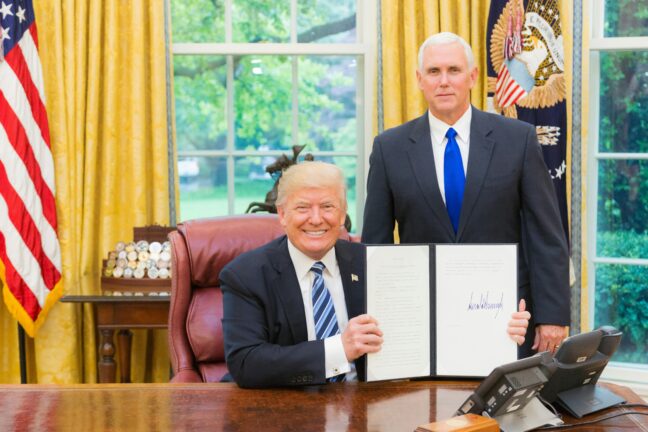The U.S. President Donald Trump used his social network Truth Social to threaten countries that impose digital taxes, legislation, rules, or regulations. He warned that unless these measures are removed, he would impose substantial additional tariffs on exports to the United States. Trump is also allegedly considering sanctions on EU officials responsible for implementing the Digital Services Act.
The announcement comes just days after the EU and U.S. issued a joint statement outlining an agreement on reciprocal, fair, and balanced trade. That statement did not refer to new tariffs and confirmed that tariffs on semiconductors would not exceed 15%. It also highlighted the EU’s commitment to purchase at least $40bn worth of U.S. AI chips for its computing centres.

Back in July, after reaching an agreement with the Trump administration, Commission President Ursula von der Leyen described the deal as setting a “clear ceiling” to provide predictability for European businesses. But with Trump’s latest intervention, it appears that further surprises may be on the way.
Washington considers sanctions on EU officials
According to Reuters, the Trump administration is also considering sanctions, including visa restrictions, on EU or member-state officials responsible for implementing the Digital Services Act (DSA). U.S. officials argue the law could censor Americans and impose additional costs on U.S. tech companies. It remains unclear which officials they might target.
This move follows earlier warnings made in May by Secretary of State Marco Rubio, who argued that visa restrictions could be applied to foreign nationals deemed responsible for censoring protected expression in the United States. Rubio said it was “ unacceptable for foreign officials to demand that American tech platforms adopt global content moderation policies or engage in censorship activity that reaches beyond their authority and into the United States”.
EU defends DSA against censorship claims
The DSA is the EU’s landmark regulation for online platforms. It applies to companies such as Meta’s Facebook and Instagram, TikTok, and X. The rules require platforms to assess and mitigate major systemic risks, including the spread of harmful content, misinformation, and threats to child safety.
EU officials insist that the law intends to protect European users and not compromise freedom of speech. Commission spokesperson Paula Pinho said during a press briefing: “It’s a sovereign right of the EU and its member states to regulate economic activities on our territory, consistent with our democratic values”.
You might be interested
It’s a sovereign right of the EU and its member states to regulate economic activities on our territory, consistent with our democratic values. — Paula Pinho, Commission spokesperson
Another Commission spokesperson, Thomas Regnier, underlined that “DSA and DMA both apply to all platforms and companies in the EU irrespective of their place of establishment” and rejected U.S. claims that the law is a censorship tool, describing those declarations as “completely wrong and unfounded”.
Europe vs. U.S. tech giants
Washington sees it differently. U.S. officials have repeatedly described the European tech regulation as a barrier to free speech, with Trump allies calling it a system that would violate the First Amendment if applied in the U.S. and that unfairly harms U.S. tech companies up to $97.6bn annually.
The above mentioned social media post on legislation and digital taxes is the latest in a long line of disputes between the Trump administration and Brussels over technology and trade. From early threats of tariffs to accusations of censorship, the conflict highlights the growing divide between Europe’s push for regulation and Washington’s defence of its tech giants.











